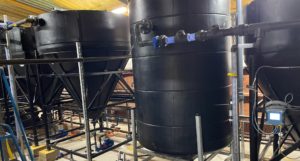Tipping points can be triggered unexpectedly by dangerous rates of change

The world is currently experiencing unprecedented rates of global warming and heatwave intensity
A recent paper by mathematicians at the University of Exeter in England, and University College Cork in Ireland, highlights the dangers of tipping points in systems that are being rapidly changed by humankind.
It is now widely understood that tipping points can occur when thresholds are crossed, such as the degree of global warming.
The new study instead highlights the dangers associated with rate-induced tipping, which is triggered not by a critical level of change but instead by how quickly that level is reached.
Once triggered, tipping points may lead to abrupt changes in natural and human systems including the reorganisation of large ocean circulation currents, extinction of ecosystem populations and blackouts on power grid networks.
Until now, critical thresholds have been assumed to be a point of no return, but the new study – published in the journal Earth System Dynamics – concludes that dangerous rates could trigger permanent shifts in human and natural systems before these critical levels are reached.
The research team say the rate of change in external forcing is often more important to control, than the peak change, if we are to avoid triggering tipping points.
“Whilst the latest Intergovernmental Panel on Climate Change 6th Assessment Report rightly highlighted the urgency to limit global warming levels, it fell short of identifying the rate of warming as a key risk factor for climate tipping points” said joint lead author Dr Paul Ritchie, of Exeter’s Global Systems Institute and the Department of Mathematics and Statistics.
“This rate-induced tipping may be of even greater concern because of the unprecedented rates of global warming and heatwave intensity we are currently experiencing.”
Joint lead author, Dr Hassan Alkhayuon, from the School of Mathematical Sciences, University College Cork, said: “The phenomenon of rate-induced tipping is not restricted to climate systems. Using mathematical modelling we observe similar effects in ecosystems and human-made systems.”
Professor Sebastian Wieczorek, from the School of Mathematical Sciences, University College Cork, added: “Rate-induced tipping captures a ubiquitous and potentially dangerous instability — failure to adapt to changing external conditions — and thus requires deeper understanding and recognition by policy makers.”
Paul D. L. Ritchie, Hassan Alkhayuon, Peter M. Cox, Sebastian Wieczorek, 2023. Rate-induced tipping in natural and human systems (https://esd.copernicus.org/articles/14/669/2023/esd-14-669-2023.html).



